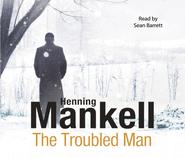По всем вопросам обращайтесь на: info@litportal.ru
(©) 2003-2024.
✖
Roseanna
Автор
Год написания книги
2019
Настройки чтения
Размер шрифта
Высота строк
Поля
5 Rather short neck. Strong features. A large mouth with full lips. Straight, thick, dark eyebrows and lighter eyelashes. Not long. Straight, short nose which was rather broad. No traces of cosmetics on her face. Fingernails and toenails hard and clipped short. No traces of nail polish.
6 In the record of the autopsy (which you have read) I place special attention on the following: She had not had a child and had never had an abortion. The murder had not been committed in connection with any conventional act (no trace of sperm). She had eaten three to five hours before she died: meat, potatoes, strawberries and milk. No traces of sickness or any organic changes. She did not smoke.
I've left a call to be awakened at six o'clock. So long.
Martin Beck read through Kollberg's observations twice before he folded the papers and laid them on his night table. Then he turned off the light and rolled over towards the wall.
It had begun to get light before he fell asleep.
6 (#u9c18454e-0e56-5b0c-af24-b584e1900a74)
The heat was already trembling over the asphalt when they drove away from Motala. It was early in the morning and the road lay flat and empty ahead of them. Kollberg and Melander sat in the front and Martin Beck sat in the back seat with the window down and let the breeze blow on his face. He didn't feel well and it was probably due to the coffee that he had gulped down while he was getting dressed.
‘Kollberg was driving, poorly and unevenly,’ Martin Beck thought, but for once he remained silent. Melander looked blankly out the window and bit hard on the stem of his pipe.
After they had driven silently for about three-quarters of an hour Kollberg nodded his head to the left where a lake could be seen between the trees.
‘Lake Roxen,’ he said. ‘Boren, Roxen and Glan. Believe it or not that's one of the few things I remember from school.’
The others said nothing.
They stopped at a coffee house in Linköping. Martin Beck still didn't feel well and remained in the car while the others had something to eat.
The food had put Melander in a better mood and the two men in the front seat exchanged remarks during the rest of the trip. Martin Beck still remained silent. He didn't want to talk.
When they reached Stockholm he went directly home. His wife was sitting on the balcony sunbathing. She had shorts on and when she heard the front door open she took her brassiere from the balcony railing and got up.
‘Hi,’ she said. ‘How are you?’
‘Terrible. Where are the children?’
‘They took their bikes and went off to swim. You look pale. You haven't eaten properly of course. I'll fix some breakfast for you.’
‘I'm tired,’ said Martin Beck. ‘I don't want anything to eat.’
‘But it will be ready in a second. Sit down and …’
‘I don't want any breakfast. I think I'll sleep for a while. Wake me up in an hour.’
It was a quarter past ten.
He went into the bedroom and closed the door after him.
When she awakened him he thought he had only slept for a few minutes.
The clock showed that it was a quarter to one.
‘I told you one hour.’
‘You looked so tired. Commissioner Hammar is on the telephone.’
‘Oh, damn.’
An hour later he was sitting in his chief's office.
‘Didn't you get anywhere?’
‘No. We don't know a thing. We don't know who she was, where she was murdered, and least of all by whom. We know approximately how and where but that's all.’
Hammar sat with the palms of his hands on the top of the desk, and studied his fingernails and wrinkled his forehead. He was a good man to work for, calm, almost a little slow, and they always got along well together.
Commissioner Hammar folded his hands and looked up at Martin Beck.
‘Keep in contact with Motala. You are most probably right. The girl was on vacation, thought to be away, maybe even out of the country. It might take two weeks at least before anyone misses her. If we count on a three week vacation. But I would like to see your report as soon as possible.’
‘You'll get it this afternoon.’
Martin Beck went into his office, took the cover off his typewriter, thumbed through the papers he had received from Ahlberg, and began to type.
At five-thirty the telephone rang.
‘Are you coming home to dinner?’
‘It doesn't seem so.’
‘Aren't there any other policemen but you?’ said his wife. ‘Do you have to do everything? When do they think you'll see your family? The children are asking for you.’
‘I'll try to get home by six-thirty.’
An hour and a half later his report was finished.
‘Go home and get some sleep,’ said Hammar. ‘You look tired.’
Martin Beck was tired. He took a taxi home, ate dinner and went to bed.
He fell asleep immediately.
At one-thirty in the morning the telephone awakened him.
‘Were you asleep? I'm sorry that I woke you up. I only wanted to tell you that the case has been solved. He turned himself in.’
‘Who?’
‘Holm, the neighbour. Her husband. He collapsed, totally. It was jealousy. Funny, isn't it?’
‘Whose neighbour? Who are you talking about?’
‘The dame in Storängen, naturally. I only wanted to tell you so that you wouldn't lie awake and think about it unnecessarily … Oh, God, have I made a mistake?’






